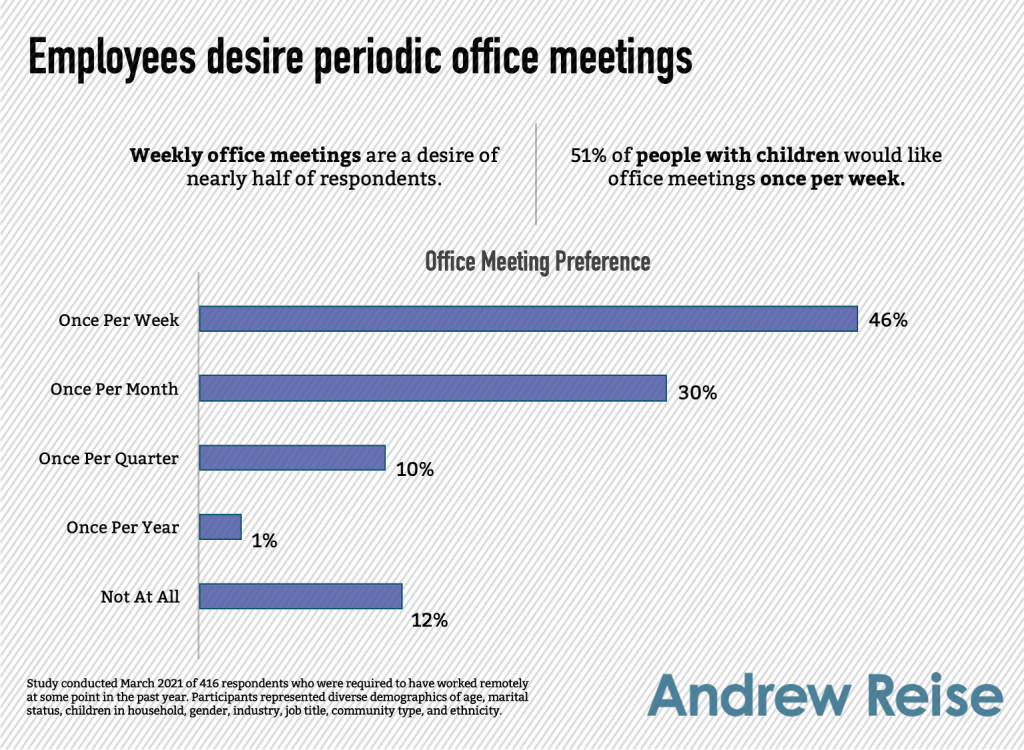In March 2021, Andrew Reise commissioned a study of 416 respondents that worked remotely over the past year. The goal of the study was to uncover insights into employee perceptions, successes, failures, and future preferences related to their work environment. We are presenting the findings in a three-part series. This article will discuss the impact of remote work on company culture.
If the last year has taught us anything, it’s that “business as usual” can be turned on its head, rearranged, and become anything but usual. While many companies in the US already offered work-from-home options to their employees, the COVID-19 pandemic made remote work an urgent necessity, and in many cases, a state-mandate. The kitchen table became the new work desk, the family dog became the co-worker we never knew we needed, and yoga pants our go-to uniform. A lot has changed since early 2020; our work environments have shifted, as have our attitudes towards work as a whole. For many US workers, working from home has given them the flexibility they always dreamed of without the commute time or need to wear business attire. Even with all of the benefits of remote work, a new study by Andrew Reise shows that employees still yearn for company culture and collaboration, something that Zoom meetings simply cannot replicate. Keep reading for more details of the study.
The Importance Of Company Culture
Company culture is more than an annual team-building event or offering free snacks in the break room. Company culture involves setting the tone for your entire organization through employee engagement, training, processes, and collaboration. Culture is challenging to maintain even during traditional times, so with more employees spread out and working from home, culture can completely fall by the wayside. Our study got to the heart of this issue, illuminating workers’ attitudes toward their “new normal.”
Though most of the respondents in our study found success (83%) and enjoyment (79%) with their remote roles, the data proves that the need for an office still exists. Over half of the respondents (53%) would like an office for collaboration with coworkers and equipment.
Though technology has made virtual meetings possible, it is not a replacement for face-to-face human connection. Working directly with co-workers during meetings means that employees experience all facets of human communication, verbal and non-verbal. Non-verbal cues, especially, are lost during virtual meetings; the hand gestures do not always make it into the Zoom call’s square frame.
Where Do We Go From Here?
As the number of COVID infections declines across the nation, businesses are left to decide if and how to bring employees back to the office. On March 26th, Facebook announced that its workers would be returning to the office at 10% capacity with precautions and a hybrid work-from-home model into the future. The hybrid model is popular with many corporations as it maintains all of the benefits of working from home while providing the opportunity for culture and collaboration.
Our study discovered that almost half of the respondents (46%) would like a weekly office meeting. Periodic office meetings allow teams to come together face-to-face to work through projects, provide updates, and connect while spending the rest of their time working at home. This model is a “have your cake and eat it too” solution for workers to enjoy the benefits of remote work with a weekly side of culture.

Looking to develop an employee-focused strategy? Check out our latest employee experience case study


